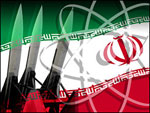 Washington Post: There’s a good case to be made that next year will finally bring a break in the Iranian standoff — by means of a military confrontation, the appearance of an Iranian bomb or a diplomatic deal of some kind. The Washington Post
Washington Post: There’s a good case to be made that next year will finally bring a break in the Iranian standoff — by means of a military confrontation, the appearance of an Iranian bomb or a diplomatic deal of some kind. The Washington Post
By Jackson Diehl
 Back at the beginning of 2006, Sens. John McCain (R-Ariz.) and Joe Lieberman (I-Conn.) made waves in Washington by predicting that the United States could ultimately have to choose between allowing Iran to go nuclear and taking military action to stop it. Pretty much every year since then, someone’s New Year’s forecast has had that fateful choice finally coming before the president.
Back at the beginning of 2006, Sens. John McCain (R-Ariz.) and Joe Lieberman (I-Conn.) made waves in Washington by predicting that the United States could ultimately have to choose between allowing Iran to go nuclear and taking military action to stop it. Pretty much every year since then, someone’s New Year’s forecast has had that fateful choice finally coming before the president.
For seven years, it hasn’t happened. But will 2013 be different?
The conventional wisdom I’ve heard from diplomats in Washington this month says probably not. Most likely, it goes, next year will look like previous years: Negotiations will limp along inconclusively. Iran will make incremental progress on uranium enrichment, while stopping short of steps that would provoke a U.S. or Israeli attack.
But there’s a good case to be made that next year will finally bring a break in the Iranian standoff — by means of a military confrontation, the appearance of an Iranian bomb or a diplomatic deal of some kind. And interestingly, one of the people making that case is President Obama’s first-term adviser on Iran, Dennis Ross, who has worked on the Middle East in five administrations.
Ross, who left the Obama White House at the end of 2011, concedes that prognosticators of an Iran crisis have a long losing streak. His reasons that next year will be different boil down to three: an approaching Iranian “breakout” capacity; Obama’s stated determination to prevent it; and the slow emergence of an economic and political climate in Iran that could prompt Supreme Leader Ali Khamenei to change course.
What is a “breakout capacity?” As Ross points out, Obama himself defined it in the third presidential debate in October. It “means that we would not be able to intervene in time to stop their nuclear program,” the president said. In other words, Iran would have acquired enough nuclear infrastructure and stockpiles of medium-enriched uranium that it could manufacture a bomb in a matter of a few weeks — before it could be detected by Western intelligence agencies or international inspectors. “That clock is ticking,” Obama said.
Ross contends that statement was deliberate, and reflected a carefully-drawn red line. In his first year in office, Obama presided over an internal debate about whether an Iranian nuclear bomb could be tolerated and contained; he eventually decided that it must be prevented, by military action if necessary. Before a meeting with Israeli Prime Minister Benjamin Netanyahu last March, Obama publicly said “it is unacceptable for Iran to have a nuclear weapon.”
A further series of public and private exchanges with Netanyahu this fall, Ross says, prompted Obama to define “breakout capacity” — a step that may have contributed to Israel’s decision to postpone military action of its own.
Netanyahu has signaled that Israel now sees the middle of 2013 as the time when Iran may acquire enough medium-enriched uranium to cross the “breakout” line. Ross puts it this way: “By the end of 2013, if nothing changes, you won’t know if they will move very quickly and present us with a fait accompli.”
It’s hard to imagine Obama explaining to the nation that another Middle East war is necessary because Iran’s uranium stockpile, which has been slowly accumulating for years, has grown a few kilograms too large. But that’s not the scenario Ross envisages. He says Obama will likely first present Khamenei with a final offer, allowing Iran a civil nuclear power program under tight restrictions. “He will make some unmistakeable demonstration that he is going the extra mile,” Ross says.
Ross has been arguing for some time that Obama should put such a comprehensive offer on the table. He thinks the present talks, in which Iran is being offered a modest easing of sanctions in exchange for halting its higher-level enrichment and shipping much of its stockpile out of the country, won’t work. “There’s a structural problem,” he says. “The Iranian perception is that they are being asked to give a diamond in exchange for a candy bar.”
But would Khamenei ever accept a big deal? Ross, who urged Obama to make that bet in his first term, sees some signs that the Iranian leadership and state-controlled media are setting up a climate in which the supreme leader could make such a decision. The reasons to do so would be two-fold: the damage to the economy from sanctions; and a conviction that in the absence of a deal there would be a U.S. attack.
For the moment, Ross says, the Iranians “are not convinced we are prepared to use force.” Consequently, he says, “at this point I would still put the prospects for diplomacy at less than 50-50.” And: “If by the end of 2013 diplomacy hasn’t worked, the prospects for use of force become quite high.”
Happy New Year.


